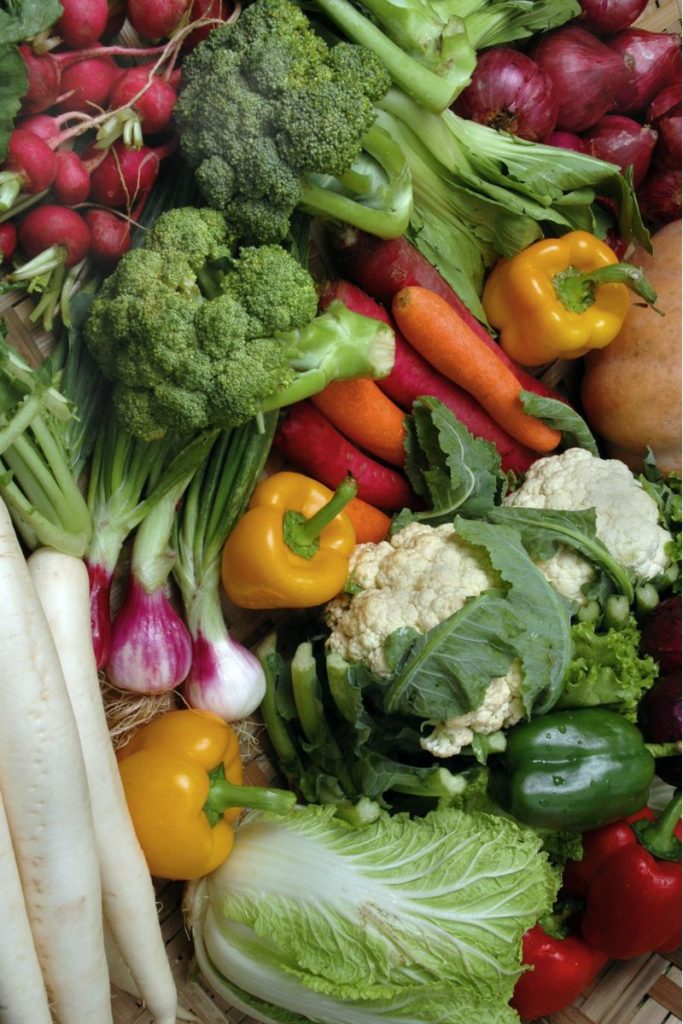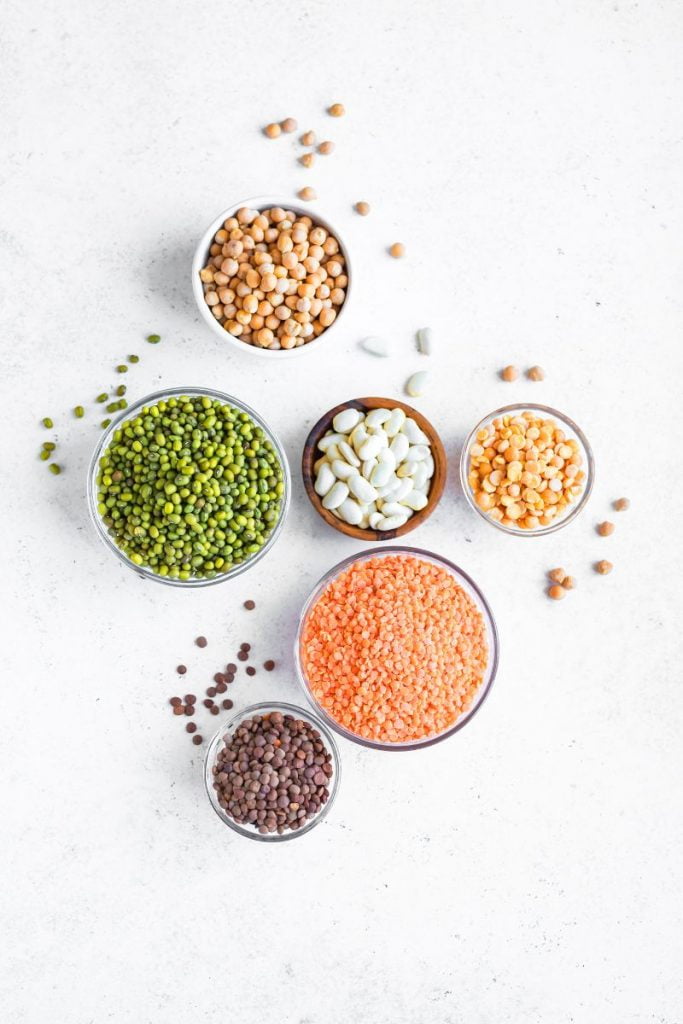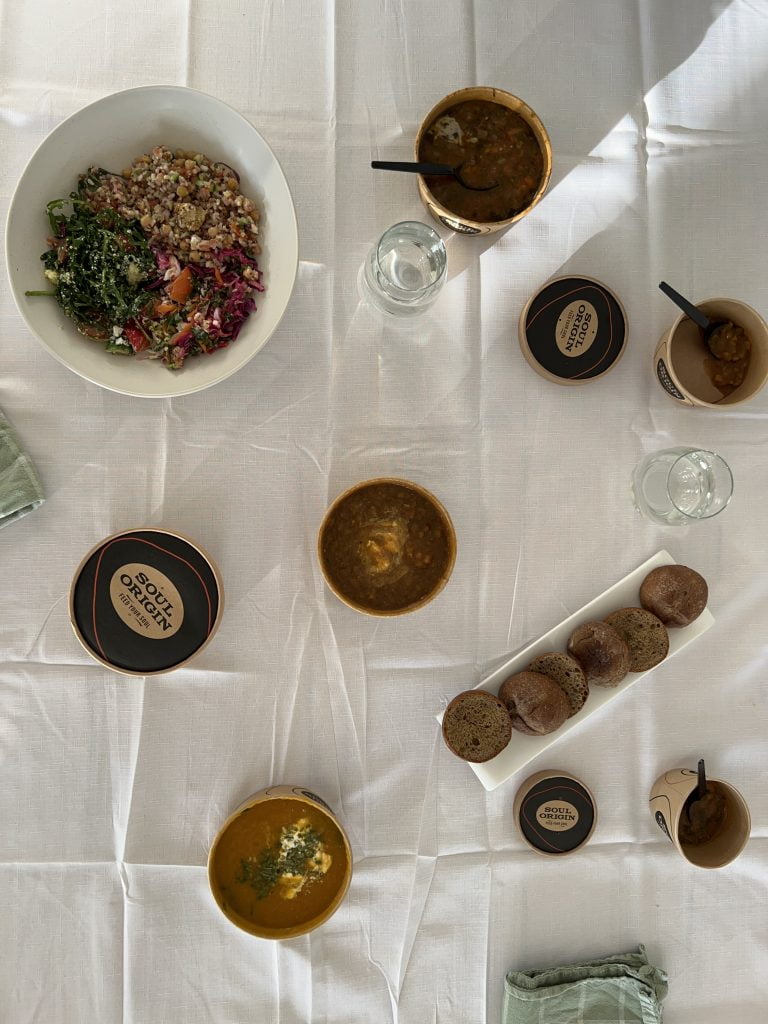Let’s face it, eating healthy in winter can be a challenge.
It’s cold, comfort foods are calling and salads really aren’t that appealing, especially when all you want to do is snuggle up on the couch with a hot chocolate and watch netflix.
But what if I told you that you could eat healthy, stay warm and enjoy your favourite comfort foods this winter? And it’s really not that hard!
All you need to do is know how to pack your winter full of veggies!
Why Pack Your Winter Full of Veggies?
When it comes to nourishing your body during winter, veggies are your best friend. Veggies are bursting with vitamins including C, A, B, C, D and E that your body needs during the cooler months to support your immune system, fight fatigue and boost your mood.
But it’s not just vitamins that veggies are rich in. Veggies are also loaded with minerals like iron, zinc, selenium and magnesium which are needed for a healthy immune system too. Plus veggies are rich in fibre, which is key for feeding your good gut bugs and subsequently nourishing your immune system too.
With only 7% of Australian adults eating enough veggies each day, it’s vital that you start to pack your winter full of veggies.

Which Veggies Should You Eat In Winter?
All veggies are good for you and you should aim to eat a variety of veggies each day in winter. But during cooler months, seasonal winter veggies – i.e. those that are in season during winter – are particularly beneficial. Not only do seasonal winter veggies taste better and cost less, but they are more nutrient dense and contain more of the vitamins, minerals and other plant compounds that your body needs at that time of year.
Here is a list of seasonal veggies you can pack into your winter:
- Beetroot
- Broccoli
- Brussels sprouts
- Cabbage
- Carrots
- Cauliflower
- Celeriac
- Celery
- Fennel
- Jerusalem artichokes
- Kale
- Kohlrabi
- Leeks
- Okra
- Onions
- Parsnips
- Potatoes
- Pumpkin
- Radicchio
- Silverbeet
- Spinach
- Swede
- Sweet potato
- Turnips
Don’t Forget About Legumes
Did you know that legumes actually count towards your daily vegetable intake?!
Legumes include all forms of beans, peas and pulses (which are the dried seed of legumes).
Some legumes you may have heard of include chickpeas, soybeans, butter beans, fava (broad) beans, cannellini beans, red kidney beans, lentils and peas.
As legumes count towards your vegetable intake, they are an easy way to pack more veggies into your eating during winter. They also contain essential nutrients needed by our body during winter as well as plant protein, low glycaemic index carbohydrates and fibre.

7 Ways To Pack Your Winter Full Of Veggies (While Staying Warm)
Packing your winter full of these healthy and hearty veggies while staying warm is easy!
Here are 7 ways you can pack your winter full of veggies and stay warm:
- Kickstart your morning with a serve of veggies – try a warm toasted veggie breakfast burrito with beans, onion, avocado, spinach and mushrooms, add mashed pumpkin, carrot or sweet potato through your bowl of warm morning oats or try a veggie omelette with onion, pumpkin and spinach. You can even try adding veggies like sweet potato and pumpkin into pancakes. Whole grain toast with hummus, avocado, and smoked salmon is a delicious savoury way to add veggies to your breakfast too.
- Add hot veggie soups to your day – soups are an incredibly easy way to pack a variety of winter veggies into your day while staying warm. Soul Origin have a delicious range of nutritious soups packed with winter veggies to keep you healthy and warm this winter. Their Traditional Pumpkin Soup is loaded with winter veggies like pumpkin, carrot, sweet potato, onion and celery and is perfect for helping keep your immune system strong. And their Tuscan Veg is bursting full of veggies including onion, carrot, kale and celery to keep you nourished this winter.
- Include legumes in your meals – add chickpeas and lentils to your curries, swap mince for kidney beans and black beans in your spag bowl and tacos, bulk up your warm casserole, soups stews with added lentils and beans. Soul Origin’s delicious Spiced Lentil Soup is packed with green lentils and an array of winter veggies rich in vitamin C and fibre. Plus their Tuscan Veg has cannellini beans which are great for a hit of plant protein too.
- Roast those vegetables – try roasting a variety of winter veg like beetroot, carrot, parsnip, potato, onion, pumpkin, broccoli and brussel sprouts. Add a dash of olive oil, a sprinkle of your favourite herbs or a drizzle of balsamic and honey. These are perfect for accompanying a dinner meal, making into a warm winter salad or just snacking on during the day. Make extra and save it for the next day too.
- Load up your dinners with veg – as well as filling half your dinner plate with veggies each night, you can add winter veg through your warm dinner meals by grating veggies through pasta and rice dishes, mixing up mash potato to include pumpkin and sweet potato, making pasta sauces and dressings using winter veggies, and adding them onto homemade versions of pizzas and burgers. And don’t forget to change up the way you cook your veg at dinner too. Always steam your veg? Try frying or roasting. It can really help you enjoy it and include more in your day.
- Order veggies when eating out – make sure to include some veggies in your meals when eating out or ordering takeaway. Soul Origin’s soups are a great option when out at the shops for an easy lunch packed full of goodness. Enriched with warm winter veggies high in vitamin C, fibre and legumes, these soups are extremely nourishing.
- Sneak some veggies into your desserts – warm winter desserts can nourish you with the inclusion of winter veggies. Think warm pumpkin pie, sweet potato and brownies and black bean pudding.

So make sure you pack your winter full of veggies and stay healthy and warm during these cooler months.
Editor's Note: This post is is written as part of my paid partnership with Soul Origin.


Love soup in winter! Great tips Bec!
Love soup in winter! T get at tips Bec!
Loved the Tuscan Vegetable Soup!
Love it for lunch!
Great advice! Will have to try some of Soul Origins soups. Perfect for winter!